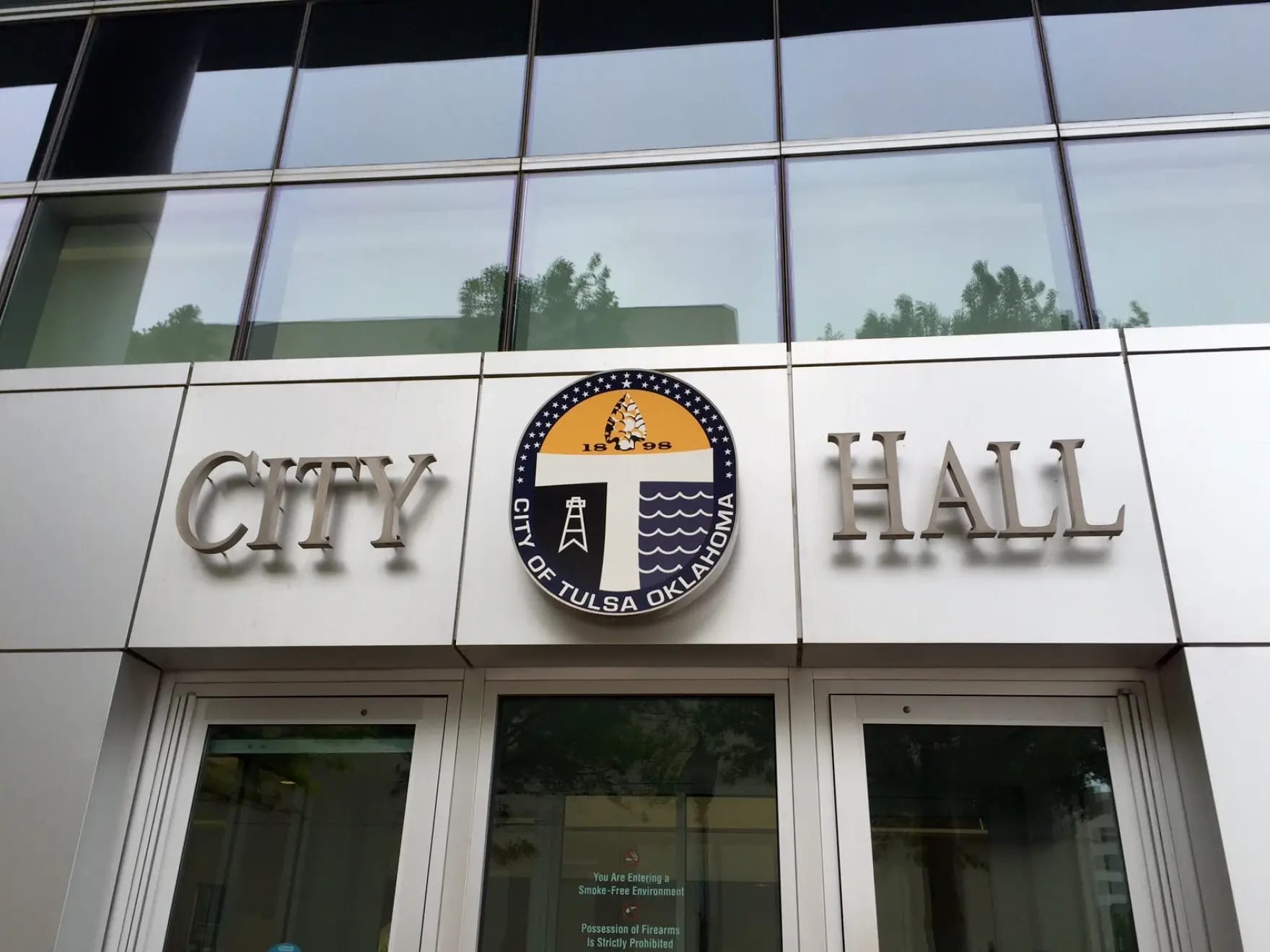

Federal judge dismisses Tulsa challenge to enforce Indigenous driver's speeding ticket

By Max Bryan
The federal courts have once again sided with tribes over whether Tulsa can prosecute Native drivers for traffic violations.
U.S. District Judge William Johnson dismissed the case of Hooper v. City of Tulsa Friday. Justin Hooper, a Choctaw citizen, sued the city after a Tulsa police officer gave him a speeding ticket in 2018.
The U.S. Supreme Court ruled in 2020 that eastern Oklahoma is still an Indian reservation, meaning Native defendants must be prosecuted in tribal or federal courts. The judge ruled in his dismissal that the Curtis Act — a pre-statehood law used to dissolve tribal governments that the city was using to contest the lawsuit — no longer applies to Tulsa.
Johnson said in his dismissal that the part of the Curtis Act used to contest Hooper's case "no longer applies to Tulsa."
"Tulsa no longer has jurisdiction over municipal violations committed by its Indian inhabitants," the dismissal reads.
In an interview with KOSU, Hooper said he believed the ticket was processed in the wrong legal system, which led him to sue the city.
"Nobody’s getting away with anything, and I don’t even believe I should get away with speeding. I just believe that people need to be in the right jurisdiction," Hooper said.
Hooper's position contradicts that of Gov. Kevin Stitt, who's used the case to claim the McGirt v. Oklahoma decision and subsequent legal rulings will create lawlessness in eastern Oklahoma.
At a press luncheon Wednesday, Tulsa Mayor G.T. Bynum argued the issues at the heart of the lawsuit were bigger than traffic enforcement.
"The issue is, who makes the laws in Tulsa that apply to everybody?" he said.
Bynum has argued a tribal-municipal framework of governance would solve legal issues related to city ordinances and tribal sovereignty. He believes legal issues would become irrelevant if the Muscogee, Cherokee and Osage tribes recognize Tulsa as a tribal city in their constitutions — something he says he's discussed with two of the principal chiefs.
A related lawsuit from the Muscogee Nation claiming the city continued to process tickets given to Native drivers after the federal courts ruled in Hooper’s favor over the summer remains in litigation.
Several cities in eastern Oklahoma have reached agreements with the tribes to split ticket revenue. Bynum says splitting ticket revenue wouldn't be an issue for Tulsa.
Muscogee Nation officials praised the ruling.
“We applaud the decision of the court to uphold the law and dismiss this frivolous case,” Principal Chief David Hill said in a written statement. “The parties behind these politically driven cases are working to make our state less safe.”

CNB contributes $20K to Cherokee Nation Angel Project

TULSA, Okla. – Cherokee Nation and its businesses are brightening the holidays for thousands of children in northeast Oklahoma through an annual tradition of supporting the Cherokee Nation Angel Project.
Cherokee Nation Businesses is contributing $20,000 to help fulfill unmet needs for children this Christmas. Each year, the company’s contribution helps Cherokee Nation’s holiday effort by providing gifts for children who might otherwise go without.
“The Angel Project is a true embodiment of Gadugi – community working together for the greater good,” said Cherokee Nation Principal Chief Chuck Hoskin Jr. “The generous donations from our businesses, employees and citizens bring holiday joy throughout the Cherokee Nation by ensuring gifts are delivered to children in need and making wishes come true for thousands of Cherokee families.”
The Angel Project successfully helps thousands of children receive gifts such as clothes, toys, games, warm bedding and winter apparel through the annual effort. Last year, the project sponsored nearly 2,500 children.
Along with CNB’s monetary donation, employees from departments throughout Cherokee Nation and its businesses contribute personal funds and collect toys and essential items, often providing the annual effort’s largest donations. This year marks the 18th consecutive year that employees have personally adopted hundreds of angels during the holiday season.
“As a company, we take great pride in our mission to serve the Cherokee Nation and we look forward to supporting the Angel Project each year,” said Chuck Garrett, CEO of Cherokee Nation Businesses. “Our employees never waiver in their commitment and dedication to helping fulfill a need within in our communities, but it is especially uplifting to be able to help brighten the holiday season for so many.”
The Cherokee Nation Angel Project assists Cherokee children ages 16 or younger who fall within low-income guidelines and reside within the Cherokee Nation Reservation.
OCETI SAKOWIN TREATY COUNCIL PASS SWEEPING MEASURE SUPPORTING PALESTINIAN PEOPLE OF GAZA AND CALL FOR AN IMMEDIATE CEASEFIRE AND EMERGENCY AID FOR THE MILLIONS DISPLACED

WHO
On Thursday, December 14, 2023, The Oceti Sakowin Council – the treaty council of the Oceti Sakowin people (aka the Sioux Nation) – of the He Sapa territory (South Dakota)* unanimously passed a sweeping measure in support of the Palestinian people of Gaza and called for an immediate ceasefire and emergency aid for over two million residents of the Gaza Strip, half of whom are children.
The Oceti Sakowin Treaty Council represents all of the Tribes within the Ocet Sakowin – approximately 49 Tribes.
WHAT
In the resolution, the Oceti Sakowin Treaty Council cited their own historical genocidal experience at the hands of occupying U.S. forces and recognize the Israeli government as engaging in genocide and ethnic cleansing in a similar fashion, in real time. Prior to colonization, the Oceti Sakowin occupied a vast land area that covered 24 American states and parts of 4 Canadian Provinces. The people of the Oceti Sakowin have lived in this region since time immemorial.
Select clauses outlining the council’s views include:
WHEREAS, In 1830, Congress passed the Indian Removal Act as a means of claiming and expanding U.S. territory by violently removing Native Peoples from our homelands to territories not our own;
WHEREAS, This act was designed to cut relationships Native Peoples had with the land by removing us, destroying our homes, our medicines, our crops, our livestock, and killing any who resisted;
WHEREAS, On the other side of the world, our Palestinian Relatives in Gaza are resisting similar violence and conditions, albeit under a different timeline of settler colonization,
WHEREAS, Israel is now engaged in an ethnic cleansing campaign by explicitly requiring two million Palestinians to leave Gaza immediately or risk being bombed in their homes by the Israeli army.
WHEREAS, as of the written date of this resolution more than 18,787 Palestinians have been killed in Gaza in the last two months with 7,729 of those being children. 50,897 Palestinians are injured and 7,780 are missing in the Gaza Strip.
LINK TO FULL RESOLUTION and Media Assets:
https://drive.google.com/drive/folders/1txDtDTRW0oISV6FMboiYe7XtlrEKwL2f?usp=share_link
- Image 2864: Full resolution
- Photo 3503: (l to r) Chase Iron Horse, Krystal Two Bulls, Nadya Tannous, Aisha Mansour, Ana Alvarez, Sabrina Pourier
- Photo 4907: Council members
- Video of this week’s related solidarity statement by Red Warrior Camp on behalf of International Indigenous Youth Council; Red Warrior Camp stood with Oceti Sakowin at Standing Rock
WHERE/WHEN
The Oceti Sakowin Council met on Thursday, December 14, 2023, in the Rapid City, South Dakota, area known by the tribes as Hé Sapa.
WHY
“It is a proud day to be Lakota. The Oceti Sakowin Treaty Council not only unanimously passed a resolution unequivocally supporting our Palestinian Relatives, but added amendments that asked the Treaty Council to take the resolution to the Tribes of the Oceti Sakowin,” said Krystal Two Bulls, Executive Director of Honor the Earth. “As Peoples who are known for resisting and fighting back against settler colonialism, it is fitting that we made this stance without question. When Palestine is liberated, we will be that much closer to our sovereignty. This is who we are.”
“As a Palestinian living in exile, I will continue to fight for Landback for all my Native relatives. We have a responsibility to the Indigenous people of this land,” said Nadya Tannous, Deputy Director of Honor the Earth. “This resolution is a reminder that our Indigenous solidarity goes both ways. The Oceti Sakowin stand with the Palestinian people and will advocate for justice and Landback for all peoples under colonialism. This resolution is a continuation of a rich but little known history between the Palestinian and the Lakota, Dakota, and Nakota Peoples. We hope this will inspire other Native Nations to take a public stance on the genocide of the Palestinian people and also our liberation, on the heels of the Yurok Nation, the Winnemem Wintu Nation, and now the Oceti Sakowin.”
CONTACT:
- Aisha Mansour, Honor the Earth, Director of Communications : 218- 270-4046
- Martin Keller, Media Savant Communications: 612-220-6515
*The Sioux or Oceti Sakowin are groups of Native American tribes and First Nations peoples from the Great Plains of North America. Collectively, they are the Očhéthi Šakówiŋ, or "Seven Council Fires.” They are located in Minnesota, Nebraska, South Dakota, North Dakota, and Montana in the United States, and Saskatchewan and Manitoba in Canada.
The Black Magic of Credit Scores

By Fus Yvhikv
Do you know your credit score? More importantly, do you know HOW your credit score is calculated?
I can answer that question for you because nobody knows how our credit scores are actually calculated. The only people who know how our credit score is computed are the corporation that is the creator of this Frankensteinian monster. The formula used to calculate your credit score is a secret more closely guarded than Colonel Sanders’ secret recipe of 11 herbs and spices.
The great and powerful Oz of credit scoring is a company called FICO. FICO, formerly known as Fair Isaacs Company, is the company responsible for providing the formulas that calculate your credit scores. FICO has never revealed the witches' brew of algorithms that go into calculating your score.
FICO basically licenses its formula to the three major credit reporting agencies: Experian, TransUnion, and Equifax. These three credit bureaus use the information that they have in their database about your past credit history in order to calculate your credit score by plugging these data into the FICO model.
In the past, each of these credit bureaus has had its own proprietary credit scoring system; Equifax marketed a product called BEACON Score, TransUnion a credit score called EMPIRICA, while Experian had its Experian Scores.
More recently these three major credit reporting agencies banded together to develop a joint credit scoring product called VantageScore to try to compete with FICO’s highly profitable FICO Score. This is one of the reasons why on any given day you can check your credit and receive up to 5 different scores (which can vary widely).
However, the FICO score is clearly the dominant credit scoring system. It is used by lenders in granting and rationing credit (seemingly to the exclusion of all other credit factors) and it is used by insurance companies in setting rates for your car insurance and home insurance. In addition, FICO Scores are increasingly being used by employers with regard to hiring employees.
Given the intrusive and paramount role that FICO scores play in the everyday lives of all Americans and how such scores affect our lives for the good or the bad, one would naturally think that FICO scores would be marked by transparency, disclosure, fairness and openness. That is not the case.
Instead, in Wicked Witch of the West fashion, FICO brews up its life-controlling credit scoring formula in the deep dark lower sanctums of their corporate offices in secrecy, in darkness, in seclusion, and in a very covert manner.
Indeed, it was only in response to tremendous pressure from consumer credit groups that the great and powerful Oz relented and allowed disclosure of these all-important credit scores to individual consumers. So recalcitrant was FICO to these understandable requests that it took a federal law to compel FICO to make these scores available.
So now we can access our credit scores, but when we will be given the right to know exactly how such scores are calculated?
To be sure, there are those who aver that they understand the workings of the mystical formula to the point where they can offer credible advice as to how to improve your all-important credit score. Techniques such as keeping your overall debt to a minimum, not maxing out the credit line of your credit cards, and paying bills on time all act to create upward pressure on your score.
In addition, again seemingly only at gunpoint, FICO has publicized the five major factors that go into calculating credit scores. These are: payment history, the amount borrowed compared to available credit, length of credit history, inquiries and new debt, and type of credit (viz., installment versus revolving or credit card debt).
Knowledge of these factors and how they can be manipulated does allow an individual to improve their credit score. At the end of the day, however, this situation is akin to the story of the two blind men and the elephant wherein one man feels the elephant’s leg and says it is like a pillar and the other blind man feels the elephant’s tail and says it is like a rope. We know that there is a large creature in the room but we know not what it is.
As with KFC, we only know that there are 11 herbs and spices but we don’t know the identities of these ingredients nor the actual recipe.
There is also increasing evidence that the FICO secret formulas punish good and responsible credit decisions made by responsible and prudent consumers. Also, these FICO scores produce discriminatory behaviors concerning granting credit, housing, and employment, most particularly toward the poor, the unemployed, and those who have lost a job or have suffered a major illness.
Finally, there is this: There is a compelling body of empirical evidence and studies that show a poor correlation between one’s credit score and debt repayment. FICO scores may indeed prove to be poor predictors of future behavior. The FICO crystal ball is indeed cloudy!
In summary, given the prevalent and paramount role that FICO scores have come to play in the everyday life of most Americans, isn’t it about time that FICO come out of the dark, pull back the curtain behind which they are hiding, and reveal the ingredients to their secret potion otherwise known as the FICO Score? It is time to end the black magic of credit scores.




